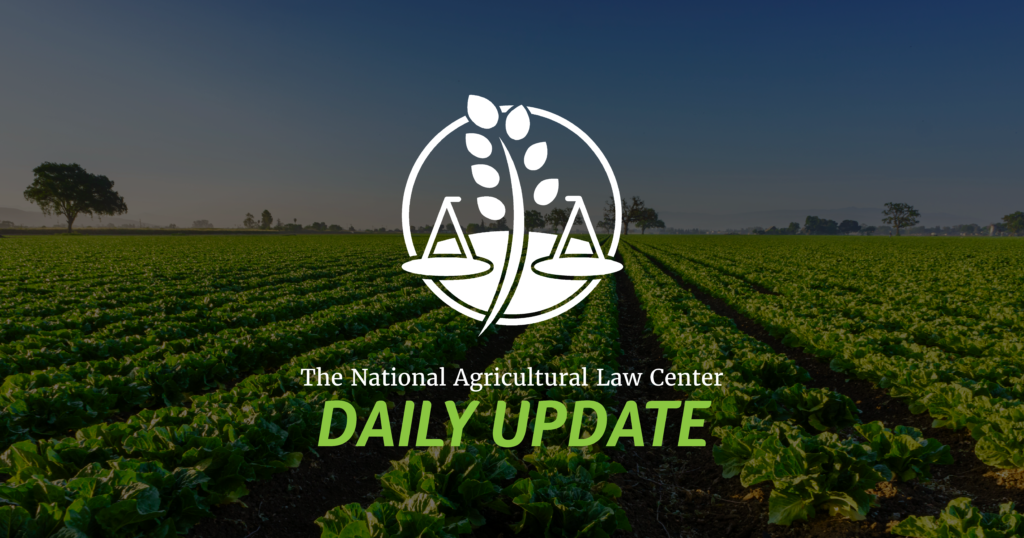A comprehensive summary of today’s judicial, legislative, and regulatory developments in agriculture and food. Email important additions HERE.
Judicial: Products Liability, Grazing Permit, ESA
In Tyson Fresh Meats, Inc. v. Dykhuis Farms, Inc., No. 3:21-CV-90 RLM-MGG, 2022 WL 971111 (N.D. Ind. Mar. 31, 2022), plaintiff Tyson sued defendants Dykhuis and McKenzie Highlands for products liability and negligence after Tyson had to dispose of over 1.7 million pounds of fresh meat that had been contaminated by hogs purchased from defendants. McKenzie Highlands moved to have Tyson’s negligence claims dismissed because Tyson had not alleged a relationship between Tyson and McKenzie Highlands that gave rise to a duty of care. McKenzie Highlands also moved to have the products liability claims dismissed on the ground that it did not manufacture or sell a product but rather only provided a service. The court found that Tyson did not allege any relationship with McKenzie Highlands that could give rise to a duty of care. The court also found that the hogs were a product under Indiana law. The court granted McKenzie Highlands motion to dismiss Tyson’s negligence claims and denied their motion to dismiss Tyson’s product liability claims.
In Oregon Nautral Desert Ass’n v. Bushue, No. 3:19-CV-1550-SI, 2022 WL 910082 (D. Or. Mar. 29, 2022), plaintiffs moved for a temporary restraining order (TRO) to prevent defendants from allowing grazing on pastures that contained Research Natural Areas (RNAs). Plaintiffs had to show that they would likely succeed on the merits, that they would suffer irreparable harm if relief was not granted, the balance of equities weighs in their favor, and that the injunction was in the public interest. The court found that plaintiffs did not show a substantial likelihood of irreparable harm because they failed to show that grazing would cause significant decline in the sage grouse population. The court also found that the balance of equities weighs in favor of the defendants because not allowing grazing on the pastures would impose severe hardships on the defendants. The court also found that the public interest in sustaining rural communities favored denial of the motion for a TRO. The court denied plaintiff’s motion for a TRO because Plaintiffs did not show a substantial likelihood of irreparable harm, the balance of the equities did not tip sharply in plaintiffs’ favor, and the public interest tipped in defendants’ favor.
In Friends of Animals v. United States Fish & Wildlife Serv., 28 F.4th 19 (9th Cir. 2022), plaintiffs sued the Fish and Wildlife Service (FWS) for violation of the Endangered Species Act (ESA) and the National Environmental Policy Act (NEPA) for a proposed experiment which grants permits allowing the lethal removal of barred owls. The court was reviewing the appeal from the district court which granted FWS summary judgment. The court affirmed the district court’s grant of summary judgment for FWS. The court held that the experiment would produce a “net conservation benefit” under the plain language of the ESA’s implementing regulations because it allowed the agency to obtain critical information to craft a policy to protect threatened or endangered species. The court also held that FWS did not have to conduct a supplemental environmental impact statement under NEPA because it had adequately contemplated this experiment in its earlier analysis.
REGULATORY: AMS, EPA, FWS
AGRICULTURAL MARKETING SERVICE
Final rule amending the origin of livestock requirements for dairy animals under the USDA organic regulations with this final rule. Info here.
ENVIRONMENTAL PROTECTION AGENCY
Notice announcing the availability of EPA’s proposed interim decision for the registration review of spirodiclofen. Info here.
FISH AND WILDLIFE SERVICE
Proposed rule announcing FWS’s finding on a petition to list the Lower Colorado River basin distinct population segment of the roundtail chub (Gila robusta) as an endangered or threatened species under the Endangered Species Act. Info here.
